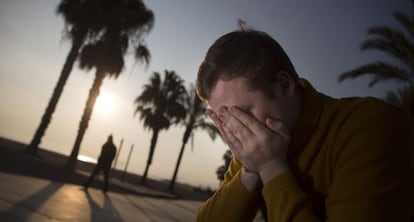Why Ukrainians adopted by Spanish families may have to go to war
Victims of the Chernobyl disaster living in Spain are receiving call-up letters from Kiev Many of the youngsters fear they will be sent to fight against pro-Russian militias


A simple letter has completely changed the stable lives of Tola and Yura, two Ukrainian youngsters aged 18 and 16 who live in Spain. The government in Kiev has called them up to serve their obligatory military service. They have been instructed to report to their corresponding delegation to be subjected to a medical test. Since they received the notification, the pair have barely slept. Should they be judged fit, they will be taken to a training camp and prepared for life on the front line of the ongoing conflict in their country, in which nearly 5,700 people have already died, according to the United Nations.
Tola has spent the last six years studying in Huesca, in the north of Spain. Yura is 16 and has spent half of his life living with Tola and four Spanish brothers. Their case is identical to those of dozens of other youngsters, who since the Chernobyl disaster have been living in Spain in their vacations or studying during term time. They are now, however, faced with doing military service back in Ukraine.
You think about having to enter a battlefield and fight on the front and it’s like you are in a film, that what’s happening isn’t real”
Slavick says he is scared, so scared that his fear sometimes leaves him paralyzed. He says he has no intention of going to war, and cannot even conceive of killing someone. He never imagined that at the age of 17 he would have to think about what he would do with a rifle in his hands. He was born in Ukraine and has spent 13 years living with an adoptive family in Barbastro, Huesca, where he is studying electronics.
“This is something I’ve been thinking about a lot lately, because me and my brothers are on the limit of the age to sign up and complete our military service,” he explains. “I know that I am incapable of taking the life of another person. I don’t care if they are pro-Russian or not. From here you think about having to enter a battlefield and fight on the front and it’s like you are in a film, that what’s happening isn’t real.”
In 2014, Tola received a certified document communicating his obligation to complete his military service. His Ukrainian parents rejected the letter and his adoptive mother immediately requested international protection for the minor in Spain. That allows him to stay in the country for at least six more months. “I don’t want to think about how this is going to be resolved, but these days it is complicated and difficult,” explains Adela, one of the youngsters’ mothers. “They are children who have all lived through their own dramas and now they are in a very different situation.”
A far-away conflict
- The Chernobyl disaster took place in April 1986, and caused the displacement of 135,000 people. Many children who were affected by the nuclear catastrophe, or were born after the incident but still suffered its effects, live or study in Spain on a part-time basis.
- Since the incident, a total of 400,000 children have been found to have been contaminated by the cesium-137 released by the power plant.
- The government in Kiev has sent letters to many of the young Ukrainians in Spain calling them up for military service, to join the fight against pro-Russian militias.
- The adoptive families have mobilized to try and avoid them being sent to the front.
- The war in the east of the country has already cost the lives of 5,700 people since April 2014, according to United Nations data.
Yura was in an orphanage before he traveled to Spain for the first time, and when he returned to Ukraine he was sent back to the public institution. “It was a disaster,” explains his Spanish mother. “We had progressed so much during the school year, and when he returned to Ukraine it was like going back to square one.”
Last summer, Adela rented an apartment in Kiev and went with her Ukrainian son to spend the time there as required by the state during the vacation months. “It’s very worrying the uncertainty that you feel in a place like that,” she explains. “Just thinking that you have to leave your child there, fending for himself in the street, causes the kind of pain that’s difficult to explain. It destroys your life.”
All of these families belong to the Aragón Infancy Aid Association, which has been taking in children from Chernobyl for the last 19 years. More than a hundred Ukrainian children now spend different periods of the year with families in the community.
Slavick says he considers himself lucky, although his life has not exactly been easy. Seen from outside, it is easy to understand the maturity with which he expresses himself. He was born in Tarasa, less than 200 kilometers from the nuclear plant at Chernobyl, where, on April 26, 1986, one of the biggest nuclear accidents in history took place, causing the deaths of around 30 people and the forced evacuation of more than 135,000. According to Ukrainian experts, the disaster ended up causing the deaths of more than 100,000 people in Ukraine, Russia and Belarus.
When he was four, Slavick was in an orphanage together with his five brothers, all of whom were in possession of a special card designating them victims of the nuclear disaster, which allowed them guaranteed access to food and medication. “We had more than other children,” he explains with an air of satisfaction. “We had food and medicine.”
I’ll never be able to give them back what they have given me. I was scared then, but it’s different to what I feel now”
He says he cannot, nor does he want to, forget about the first time he arrived in Barbastro, when he was only four years old. “I still find it hard to understand how mom and dad could be so generous. Bringing a child home from 4,000 kilometers away, and deciding to give him everything for nothing in return … I’ll never be able to give them back what they have given me. I was scared back then, but it’s different to what I feel now.”
For five years, his adoptive parents – who prefer not to reveal their identities for fear of worsening the situation – traveled to the orphanage in Ukraine to be with him during the Easter vacation. “When I saw them my eyes would light up,” he explains. “It was like my Christmas present. They made it possible for me to be a normal person.”
What does he mean by that?
“If I had stayed in the orphanage, I know that my life would have been the same as my friends back there. I’ve seen some of them again, and by my age they are alcoholics, abusers or in jail for stealing. That would have definitely been my path: I would have become one of them, a delinquent.
The youngster will turn 18 in June. His mother’s voice shakes when she talks about his future. “We had thought that by the time he had an adult passport, we would be able to present the documents needed to adopt him. Now the problem is that, once we have the passport, we risk them not letting him out of Ukraine, and he will be forced to do his military service. If that happens, we won’t be able to adopt him. The only way to stop all this uncertainty will be to get him Spanish nationality. I don’t want to think about him having to stay there.
Meanwhile, the youngster, who feels lucky to have the life he has, is keeping a close eye on the news coming from his home country, and is hoping for a genuine ceasefire. He only wants want thing: “To carry on being a normal kid.”
Tu suscripción se está usando en otro dispositivo
¿Quieres añadir otro usuario a tu suscripción?
Si continúas leyendo en este dispositivo, no se podrá leer en el otro.
FlechaTu suscripción se está usando en otro dispositivo y solo puedes acceder a EL PAÍS desde un dispositivo a la vez.
Si quieres compartir tu cuenta, cambia tu suscripción a la modalidad Premium, así podrás añadir otro usuario. Cada uno accederá con su propia cuenta de email, lo que os permitirá personalizar vuestra experiencia en EL PAÍS.
¿Tienes una suscripción de empresa? Accede aquí para contratar más cuentas.
En el caso de no saber quién está usando tu cuenta, te recomendamos cambiar tu contraseña aquí.
Si decides continuar compartiendo tu cuenta, este mensaje se mostrará en tu dispositivo y en el de la otra persona que está usando tu cuenta de forma indefinida, afectando a tu experiencia de lectura. Puedes consultar aquí los términos y condiciones de la suscripción digital.








































